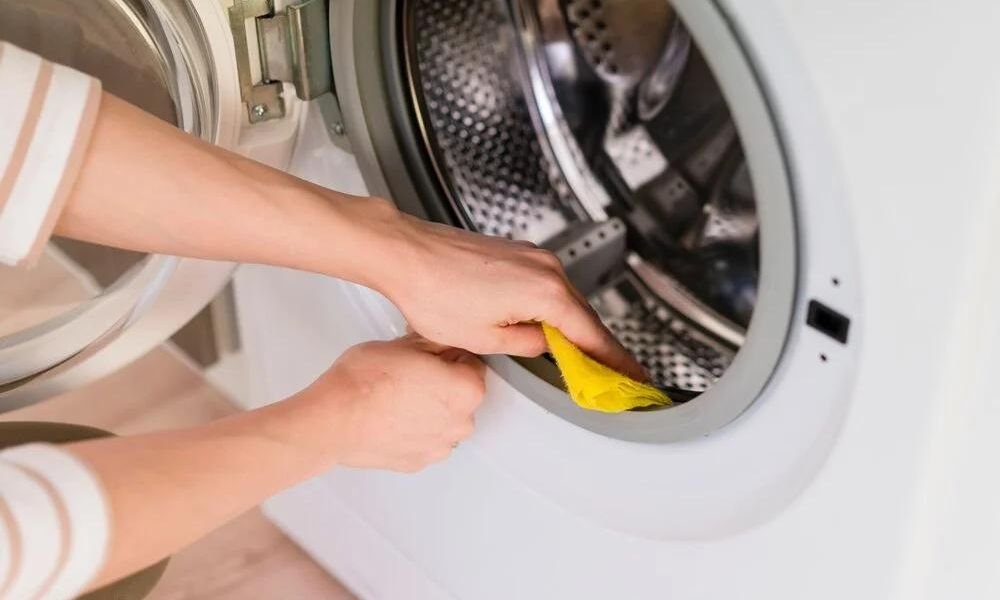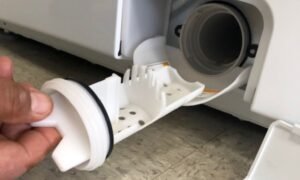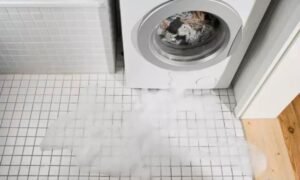Last updated on June 27th, 2023 at 12:51 am
Welcome to the comprehensive guide about washing machine upkeep! We will examine the essential procedures and advice to guarantee the durability and effectiveness of your washing machine in this extensive piece. We can help you with everything from comprehending the value of maintenance to addressing typical problems. Learn about important duties including cleaning and maintenance schedules, load capacity considerations, water supply and hose maintenance, and correct seal and gasket care. Additionally, we will offer professional advice on detergent choices, temperature settings, and routine maintenance for optimum efficiency. Prepare to improve your washing machine’s performance and longevity with our professional advice!
Why Maintenance Is Important
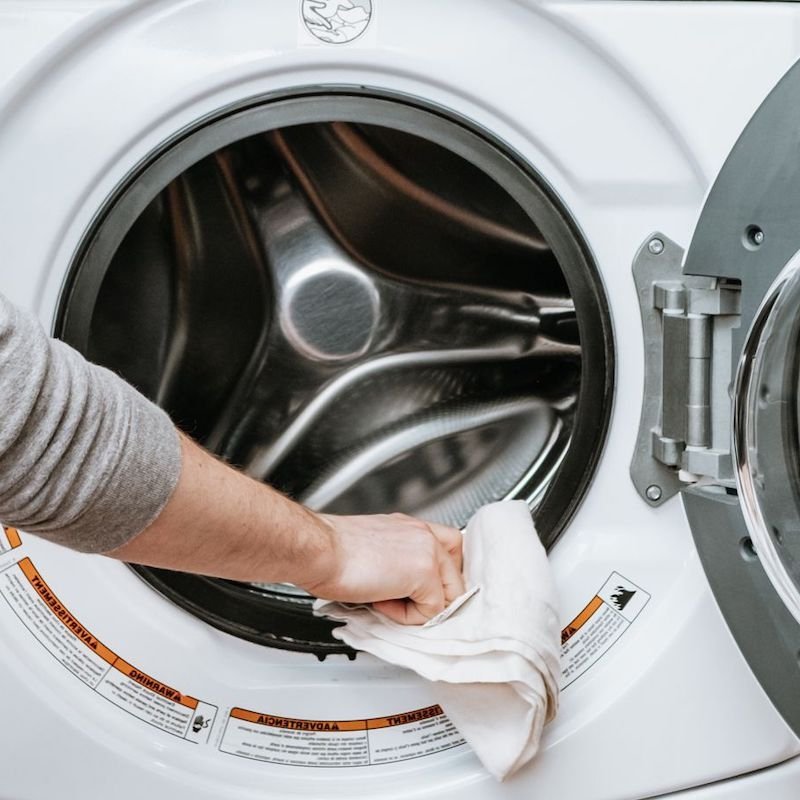
Photo Credit: archziner
For your washing machine to last a long time and run well, proper maintenance is essential. This is why upkeep is important:
Performance and Efficiency
Performing at its peak requires routine maintenance for your washing machine. Cleaning the detergent dispenser, filters, and drum regularly ensures optimum performance and effective cleaning outcomes by preventing dirt and residue accumulation. Additionally, well-maintained equipment uses less water and energy, which lowers utility bills.
Preventing Costly Repairs
Neglecting maintenance can lead to costly repairs. Early intervention can stop small problems from becoming more serious ones. Regular inspections and maintenance work aid in locating and fixing possible problems before they cause serious harm.
Extended Lifespan
You may increase the lifespan of your washing machine by giving it proper maintenance. The total durability of the equipment is increased and the likelihood of failures is reduced thanks to proper maintenance.
Hygiene and Odor Control
Cleaning the drum and eliminating residue buildup helps maintain a hygienic environment inside the washing machine. This keeps your laundry clean and fresh and lessens the likelihood of undesirable odors.
Protection under Warranties
Many washing machines come with warranties that call for regular upkeep. Maintaining the warranty coverage by according to the manufacturer’s maintenance recommendations ensures that any unanticipated problems may be fixed without incurring additional fees.
Safety
Clean washing machines function in a secure manner. Inspections of the hoses, connectors, and electrical parts on a regular basis assist to avoid dangers like water leaks, electrical problems, or potential accidents.
Essential Washing Machine Maintenance Tasks
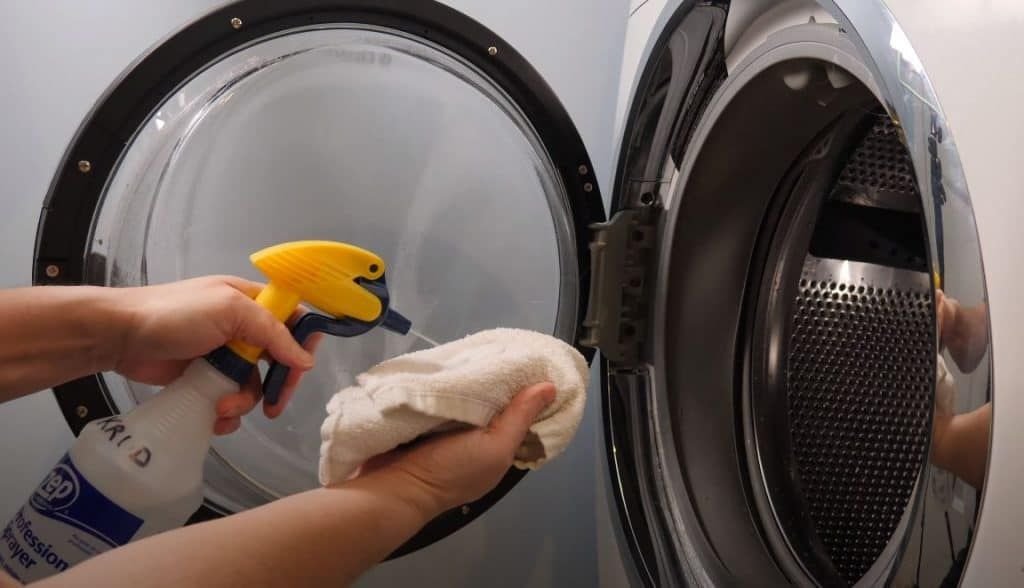
Photo Credit: maidforyou
For your washing machine to operate at its best and last as long as possible, you must undertake certain crucial maintenance activities. The principal upkeep duties are as follows:
Schedule for maintenance and cleaning
Regular Cleaning:
– Clean the drum: After every few cycles, wipe the interior of the drum with a moist cloth or sponge and a mild detergent to get rid of any debris or residue.
– Clean the door seal: Using a moderate vinegar and water solution or another suggested cleaner, check and clean the door seal on a regular basis. To stop the formation of mold or mildew, wipe it dry.
– Clean the detergent dispenser: Remove the detergent dispenser tray and clean it thoroughly with warm, soapy water. In order to guarantee appropriate detergent dispensing, remove any accumulation or residue.
– Clean the filters: In accordance with the manufacturer’s recommendations, inspect and clean any filters, including lint filters and pump filters. This enables effective drainage and helps prevent obstructions.
Maintenance per month:
– Perform a maintenance cycle: Once a month, perform an empty cycle with hot water, a washer cleanser, or a vinegar and baking soda solution. This aids in cleaning the drum and interior components of any bacteria, smells, or detergent residue.
– Examine hoses and connections: Look for any wear, fractures, or leaks in the drain hose and water intake hose. Replace any broken hoses and tighten any loose connections.
Seasonal Maintenance:
– Clean the outside: Use a moist cloth to wipe the washing machine’s exterior clean of dirt and grime.
– Check the leveling: To guarantee stability and reduce vibrations, the washing machine’s leveling should be periodically checked and adjusted.
Ongoing Practices:
– Leave the door and detergent dispenser open: After each wash, leave the door and detergent dispenser open to allow air circulation and prevent moisture buildup and potential mold growth.
– Prevent overloading: Adhere to the load capacity recommendations provided by the manufacturer and refrain from overloading the machine, which can wear out the engine and reduce cleaning effectiveness.
You can maintain your washing machine clean, effective, and in top functioning condition for years by following a routine of maintenance and cleaning. Based on your usage and the manufacturer’s advice for your particular model, adjust the frequency.
Overloading and Load Capacity
For your washing machine to operate well and last a long time, it’s important to know its load capacity and to prevent overloading it. What you need to know is as follows:
Load Limits:
– Every washing machine has a specified load capacity, which refers to the maximum weight of laundry it can handle in a single cycle. Typically, it is expressed in pounds or kilograms.
– Depending on the size and brand of the washing machine, the load capacity varies. The suggested load capacity for your particular equipment should be found in the manufacturer’s recommendations in the user manual.
Effects of Overloading:
– Overloading the washing machine with excessive laundry can lead to several negative consequences.
– Decreased Cleaning Efficiency: An overcrowded drum prevents the garments from moving smoothly and circulating in the water, which leads to insufficient cleaning. Uneven detergent distribution might produce subpar cleaning outcomes.
– Increased Wear and Tear: Overloading places an excessive amount of stress on the machine’s motor, suspension system, and other parts. Your washing machine’s lifespan may be shortened as a result of increased wear and strain, potential damage, and other factors.
– Imbalance and Vibration: When the drum is overloaded, the spin cycle might result in an imbalance that causes excessive vibration. This can be annoying, interfere with the equipment’s operation, and potentially harm the machine or nearby items.
Tips to Avoid Overloading:
– Adhere to the load capacity recommendations provided by the manufacturer for your specific washing machine model.
– Separate laundry based on fabric type, color, and level of dirtiness to ensure balanced loads.
– Fill the drum loosely, leaving enough space for the clothes to move around freely during the wash cycle.
– If you are unsure of the weight of your clothes, it is best to wash smaller loads and err on the side of caution.
You can make sure that your washing machine runs effectively, produces good cleaning results, and lasts longer without needless strain or damage by following the load capacity requirements and avoiding overloading.
Supply of water and hoses:
- Check the water intake hoses on a regular basis for wear, cracks, or leaks. Every three to five years, or as the manufacturer specifies, replace them.
- Make sure the washer and the water supply valve on the hoses are firmly attached.
- To avoid obstructions and guarantee appropriate water flow, inspect and clean the water input filters.
Seals and Gaskets Maintenance:
- Look for wear or damage in the door seal and any gaskets. They should be cleaned often to get rid of any dirt or detergent buildup.
- Do not use abrasive cleaning agents since they might harm the seals.
- Between washes, leave the door and detergent dispenser open to let air circulate and stop mold formation.
Continual Inspections:
- Check the machine on a regular basis for any loose connections, strange noises, or vibrations.
- Any strange odors or leaks should be attended to right away.
- For detailed maintenance recommendations adapted to your washing machine model, always refer to the manufacturer’s handbook. Assuring effective functioning and extending the lifespan of your washing machine are made possible by doing these crucial maintenance procedures on a regular basis.
Troubleshooting Common Washing Machine Issues

Photo Credit: manwithawrench
You can quickly locate and fix faults by troubleshooting typical washing machine difficulties. The following are some typical problems and possible solutions:
Not starting the machine or power problems:
– Verify that the washing machine is correctly connected to a working electrical outlet.
– Inspect the circuit breaker or fuse box to make sure no breakers have tripped or fuses have blown.
– Check that the door or lid is shut tightly since many machines include safety features that inhibit operation when they are improperly closed.
– If the problem continues, refer to the user guide or get in touch with a specialist for more help.
Excessive vibration and noise
– Use a leveling tool or adjust the feet to make sure the washing machine is level. During operation, uneven positioning might generate a lot of vibration and noise.
– Search the drum or the space between the drum and the tub for any loose things, such as coins or tiny objects. To avoid noise and potential harm, remove them.
– Check the shock absorbers or suspension for signs of wear or damage. Replace them if required by according to the manufacturer’s directions.
– It is advised to visit a professional for further evaluation and repair if the noise or vibration persists.
Drainage issues and water leaks:
– Check for leaks or loose connections in the water inlet hoses. If necessary, tighten or swap out the hoses.
– Check the drain pipe for kinks or clogs. Make sure sufficient drainage is in place and remove any blockages.
– Check for wear or damage on the door seal or gasket. Regularly clean it, and replace it if required.
– It is advised to seek expert assistance to find the root of the problem if the leaks continue or you observe water accumulating around the machine.
Spin Cycle Issues:
– Look for an uneven load. Rearrange the clothes evenly within the machine, then close the door or lid tightly.
– Check the machine’s leveling to make sure it will be stable during the spin cycle. If necessary, adjust the feet or use a leveling device.
– If the issue continues and the machine routinely spins unevenly or not at all, it might need to be inspected and repaired by an expert.
Remember to always refer to the user manual provided by the manufacturer for specific troubleshooting steps and guidelines. It is advised to get additional help from a certified expert or the manufacturer’s customer care if you are unclear or unable to fix the problem on your own.
Expert Tips for Optimal Washing Machine Performance
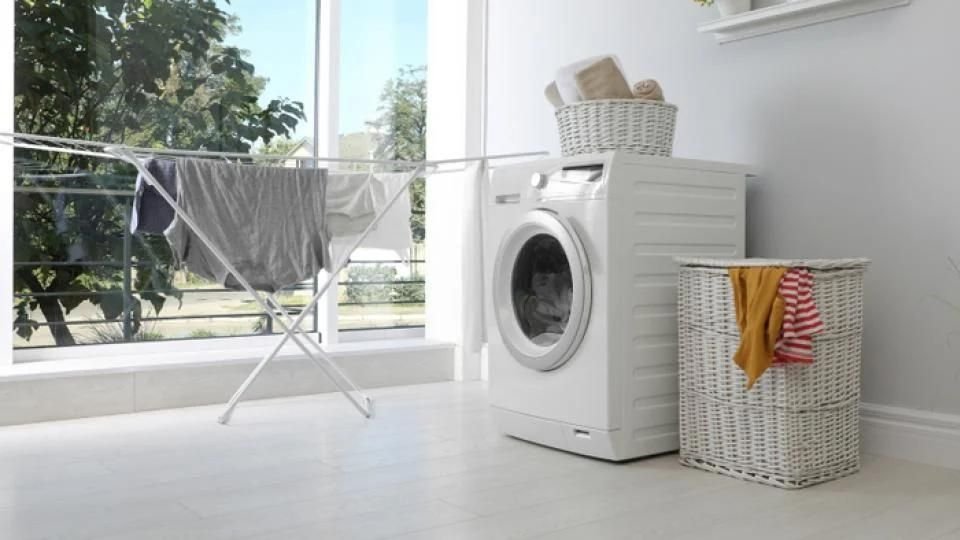
Photo Credit: expertreviews
Consider putting this professional advice into practice to guarantee ideal washing machine performance:
Choosing the Right Detergent:
– To get the greatest cleaning results, use a detergent made exclusively for your kind of washing machine (top-load or front-load).
– Follow the manufacturer’s suggested detergent usage guidelines. Too much detergent usage might lead to residue accumulation and reduce efficiency.
Energy Efficiency and Temperature Settings:
– Change the temperature settings in accordance with the kind of washing and the care recommendations on the labels of the clothing.
– Washing at lower temperatures, including cold or eco-friendly settings, can aid in energy conservation and cut power bills. For goods that are really dirty or to sterilize, use higher heat.
Size and Distribution of Loads:
– Refrain from overloading the device. To guarantee effective cleaning and avoid strain on the motor, adhere to the load capacity guidelines stated by the manufacturer.
– Evenly distribute the clothes in the drum to keep it balanced during the wash cycle and cut down on vibration and noise.
Regular Upkeep and Professional Repairs:
– Carry out routine upkeep chores including wiping the drum, cleaning the detergent dispenser, and checking the hoses and seals. For detailed maintenance recommendations, consult the
manufacturer’s instructions.
– To address any underlying concerns, extend the machine’s lifespan, and maintain peak performance, think about arranging expert service annually or as advised by the manufacturer.
Water Savings:
– For each load size, use the appropriate water level setting. Use no more water than is absolutely necessary.
– When feasible, use the machine’s water-saving or environmentally friendly cycles to save water and lessen your influence on the environment.
Getting Rid of Mold and Odor:
– In order to promote airflow and avoid the development of mildew or foul odors, leave the lid or door of the washing machine open in between cycles.
– Regularly wipe the rubber door seal and drum to get rid of any moisture or detergent residue that can cause mildew or smell.
This professional advice can help you get the most out of your washing machine’s performance, improve cleaning outcomes, conserve water and energy, and prolong the life of your device.
Conclusion
To summarize, regular upkeep and care are crucial to maximizing the effectiveness, durability, and efficiency of your washing machine. Its efficient functioning is facilitated by routine cleaning, adherence to load capacity recommendations, an inspection of hoses and seals, and expert maintenance appointments. You may improve the machine’s performance while saving electricity and water by using the proper detergent, altering temperature settings, and practicing water efficiency. Furthermore, resolving typical problems through troubleshooting and getting expert assistance as required guarantees efficient functioning. You can take advantage of clean laundry, financial savings, and a well-functioning washing machine for years to come by putting these maintenance procedures and professional advice into practice.
Frequently Asked Questions
1. How frequently should my washing machine be cleaned?
– Depending on use and water hardness, it is advised to clean your washing machine every one to three months. Mold, stink, and residue accumulation are all prevented by routine cleaning.
2. Can I clean the drum using common home cleaners?
Use gentle, non-abrasive cleansers made especially for washing machines whenever possible. Regular home cleansers might use strong chemicals that leave residue or harm the equipment.
3. Why does my washing machine not properly drain?
– Problems with drainage might be brought on by a clogged drain hose, a clogged pump filter, or a broken pump. Make sure these components are installed and working properly, remove any obstacles, and check for blockages.
4. How can I make the spin cycle less noisy and vibrational?
Vibration can be decreased by leveling the machine and adjusting the feet. Make sure the load is spread equally across the drum. Additionally, look for any broken or loose suspension parts.
5. Is a professional’s assistance required while maintaining a washing machine?
– Although certain maintenance activities may be completed by the user, it is advised to hire a professional at least once a year. Professionals with the necessary training can completely examine, clean, and take care of any underlying problems that the user might not be able to see.
